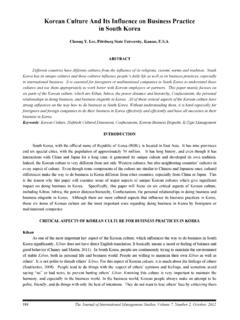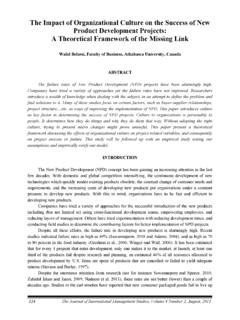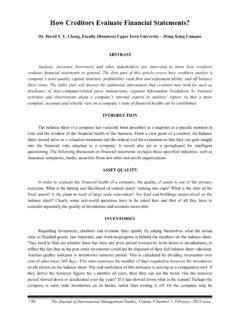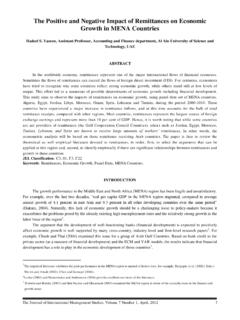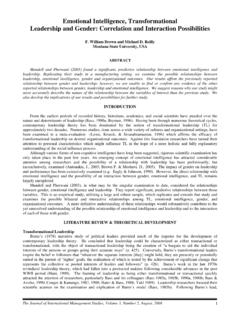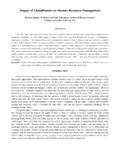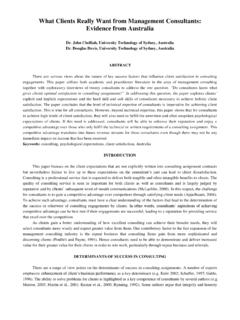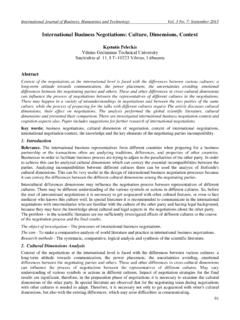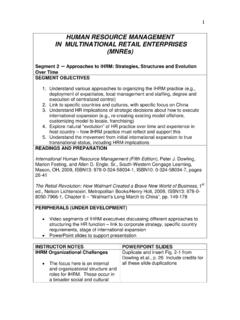Transcription of Negotiations Between Chinese and Americans: Examining the ...
1 The Journal of international Management Studies, Volume 7 Number 1, April, 2012 191 Negotiations Between Chinese and Americans: Examining the Cultural Context and Salient Factors Asuman Akgunes, Stephen F. Austin State University, USA Robert Culpepper, , Stephen F. Austin State University, USA ABSTRACT There is a vast chasm Between the american and Chinese cultures regarding foundational philosophical assumptions, historical influences, economic systems, business strategies and tactics, and myriad business-related interpretations and understandings. These differences create a great challenge for achieving successful outcomes as a result of business Negotiations . This paper examines differences in the cultural contexts of China and the US as they relate to business Negotiations , and investigates differences in negotiating styles and practices. Recommendations for avoiding pitfalls and maximizing negotiating effectiveness are offered.
2 INTRODUCTION Cross-border Negotiations face the challenge of completely different negotiating processes and styles, based on local history and culture. Negotiators are often tempted to consider the traditional way of doing business in a foreign country with different traditions and customs inappropriate or even rude. Historical backgrounds with differing events/timelines have created cultures that are very rich and distinct from one another. These cultural patterns are woven deep in the fabric of business Negotiations , impacting success and failure in often subtle ways. This article will examine and compare negotiation styles from two of the most disparate cultures in the world, those of the United States and China. The Chinese market has become more and more open during the last three decades. An understanding of cultural differences Between the US and China has become increasingly important for companies in both countries.
3 Though successful Negotiations are often predicated on cultural understanding, differences impacting business Negotiations are not easy to sort out. While negotiation strategies developed by the each cultural group are conceptually consistent with their shared values, culture is based on much more than values. It involves a vast array of behaviors, institutions, norms and assumptions (Hofstede, 1980). The first order of business in our explanation of cultural effects on Negotiations will be to examine more distal elements of the cultural context in which Negotiations take place, and then we will discuss specific proximal cultural factors which influence the negotiation process directly. CULTURAL CONTEXT Education Education in China incorporates direct instruction and students do not ask a lot of questions. This has lead Chinese people to accept things without asking too many questions.
4 The Americans use a constructivist approach to education and questioning things is encouraged. The differences in education styles have led the Chinese to be overconfident in their discussions and draw hasty interferences from things said during Negotiations , which are not warranted (Li, Chen, & Yu, 2006). This may explain why the Chinese have to be careful not to read too much implied meaning into spoken and written words that make up Negotiations , and rely instead on a more literal interpretation. The Journal of international Management Studies, Volume 7, Number 1, April, 2012 192 Non-verbal communication In non-verbal communication Americans tend to make a lot of eye contact. This is considered to be a way of showing interest and good will. The Chinese like to show respect by doing exactly the opposite and avoiding eye contact (Pye, 1992).
5 They believe that too much eye-contact is considered staring. This disparity in a fairly minor area of body language can lead to major misreading of the attitudes and intentions of the other party. This in turn can injure trust, so crucial to success in negotiating with the Chinese . Xenophobia and xenophilia Xenophobia is a distrust of all things foreign to one s own culture. Xenophilia is a lust to obtain all things new and or foreign. The Chinese have become inclined to distrust anything and everyone from foreign lands due to their history of violent revolutions and government seizures and changes (Pye, 1992). On the other hand, they have also seen the new technologies and high standard of living in the West, and many Chinese struggle with these mixed feelings as they pursue business opportunities with foreigners and seek to acquire western technologies (Pye, 1992). Philosophical foundations There are three main philosophical foundations of Chinese culture, Confucianism, Taoism, and Buddhism (Fang, 2006).
6 Famous in China, the Chinese philosopher Confucius lived 2000 years ago and taught about the importance of human relationships and their hierarchy. The second philosophical foundation is Taoism which deals with life being in harmony with nature. Within Taoism there is a concept of dualism, or the need for two opposing forces to work in harmony. Finally, Buddhism deals with the immortal world or religious aspects of the Chinese culture (Fang, 2006). Though all of these philosophies may influence the thoughts and behaviors of Chinese , perhaps the greatest influence is wielded by China's Confucian legacy. For example the widely discussed and researched phenomenon of Chinese overconfidence, discussed above, is thought by some to descend from Confucianism. Economic systems China's economic system differs quite substantially with those typically found in the West, and is very different from the US system in particular.
7 The Chinese have a socialist government with a socialist economic system, focused on promoting the well being of all the people (Ralston, Holt, Terpstra, & Kai-Cheng, 2007). Socialist countries may have only one business in a given industry, owned by the state, while Americans employ a capitalist economic system with numerous privately-owned companies competing for the same sales in the same businesses. In general, cultures found in socialist countries tend place a higher priority on cooperation both within and Between business entities, while cultures found in highly capitalist countries place greater value on competition. CULTURAL INFLUENCES ON NEGOTIATION Cultural dimensions Hofstede s (1980) study on culture identified several dimensions of culture, and his thinking has led to a framework called high and low context cultures. In a high context culture such as the Chinese , there is more focus on taking care of the group rather than individual interests (Ford, LaTour, Vitell, & French, 1996).
8 Friends are expected to help each other and there is a mistrust of authority. Americans have what is called a low context culture and see themselves as individuals. They use the legal system to enforce contracts in lieu of trust-based relationships. Chinese and american managers have very different expectations about the atmosphere that should prevail for business Negotiations . In China there are usually many people from both companies meeting to discuss topics within the Negotiations , while in America typically only one person or a very few from each company meet to work out a deal. In a high context culture like the Chinese , social context, personal relations and non-verbal behavior are all very important in negotiation (Zhao, 2000). These are more important than the legal contract that materializes from the negotiation. A few words can mean quite a lot.
9 The atmosphere, , tension or harmony, of the meeting can make or break the Negotiations . The group is always more important than individual interests in China. The Chinese believe in The Journal of international Management Studies, Volume 7 Number 1, April, 2012 193 doing what is right, not just following legal requirements. Their typical view of time horizon is fifty to a hundred years. They will sacrifice short term results for the stronger long term goals (Zhao, 2000). When a high context culture such as the Chinese is negotiating with a low context culture such as that predominate in the , special care should be taken in the words chosen. Words have very specific meanings in low context cultures and virtually all of the meaning in communication is transmitted through them. What can be implied or inferred from words is less important, rather the focus is on the words themselves (Zhao, 2000).
10 In a low context culture, the written contract or legal document is what counts (Palich, Carini, & Livingstone, 2002). Contracts tend to be quite lengthy and wordy in order to cover every possible contingency with precision, leaving as little ambiguity as possible. Thus, in low context cultures it can take many words to convey very little meaning. In addition, contracts tend to be focused on the short term, typically around five to ten years (Ford et al., 1996). Long-term goals sometimes are given short shrift by Western negotiators when the negotiators themselves are compensated according to short-term achievements and companies are focused on short term profits. When managers from low context cultures, such as that of the , encounter high context cultures they should focus on a few critical key aspects of cultural variation.
